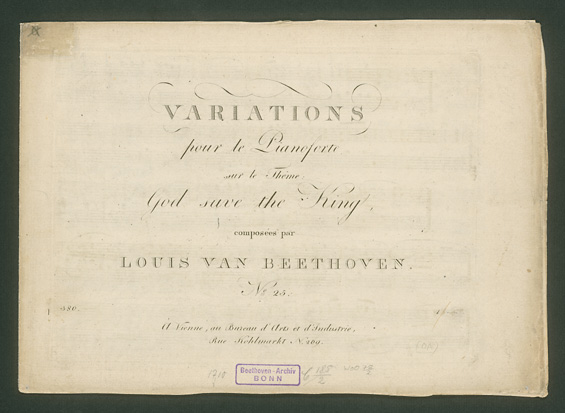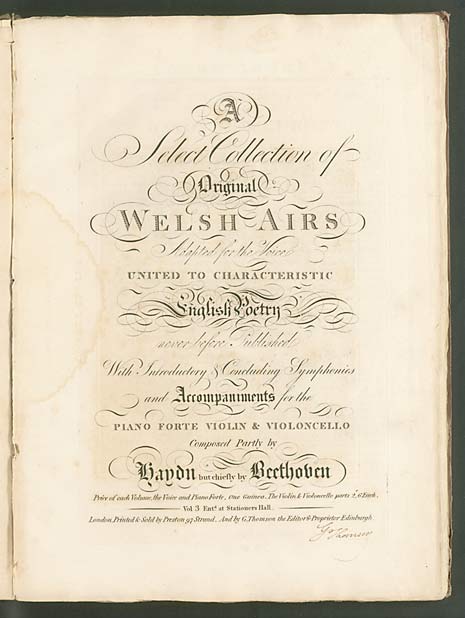Beethoven's relationship to Great Britain
Folk song collector George Thomson
George Thomson (1757-1815), a public servant and passionate folk song collector living in Edinburgh strove to save the folk melodies of his home country from falling into oblivion. His suggestion directed to Beethoven to compose six sonatas about Scottish melodies marks the beginning of Beethoven's evident relationship to Britain. Beethoven's reply letter dated October 5th, 1803 is the composer's first letter across the Channel. Although the project was never carried out because the parties involved were not able to come to an agreement, a vivid business contact developed until 1820. At the end of October Beethoven offered the piano variations on the English folk songs "God save the King" and "Rule Britannia" WoO 78 and 79 for printing. « Je vous envoie ci joint des Variations sur 2 thêmes anglais, qui sont bien faciles et qui, à ce que j'espère, auront un bons succès. » With his suggestion Thomson might even have initiated the composition of the variations on this melody that even people on the Continent knew and cherished. Both pieces were first published in Vienna. Half a year later Clementi published "God save the King" in London but it took two decades for "Rule Britannia" to be published by an English publishing house. Beethoven used both melodies again in 1813 for his "Grand Battle Symphony" op. 91.On the back of the calculation Thomson briefly summarised Beethoven's letter in which the composer also wrote that he was working on the 43 songs Thomson had sent.
Thomson hoped to increase the folk melodies' popularity by means of a contemporary composition. By adapting the pieces for piano trio - then popular for making music at home - he wanted to give the British bourgeoisie an insight into "original" music. He ordered these adaptations from renowned composers such as Joseph Haydn, Leopold Kozeluch, Ignaz Pleyel and Beethoven. All in all 150 song adaptations by Beethoven of Irish, Welsh and Scottish songs have been preserved. In September 1809 Thomson had sent Beethoven 43 melodies and explicitly asked for an easy piano part. He would do so repeatedly in the future. In the mentioned letter dated November 23rd Beethoven pointed out that this was a less pleasant work for an artist but surely a good work for business. Initially he received three ducats for each adaptation, later on four and then five. He also asked to obtain the texts in the future, a request Thomson did and could not fulfil. The text is not identical with that of the original folk songs but Thomson had famous poets such as Robert Burns and Sir Walter Scott write new lines for the completed adaptations. In July 1810 Beethoven sent the final 53 adaptations each consisting of three copies (one by himself and two by copyists) to England by various means. Thomson, however, waited in vain. The present copy was a gift from Beethoven to his pupil Archduke Rudolph. In the summer of 1811 he borrowed it to make a new one for Thomson. The receipt of this copy was confirmed in early August 1812.







